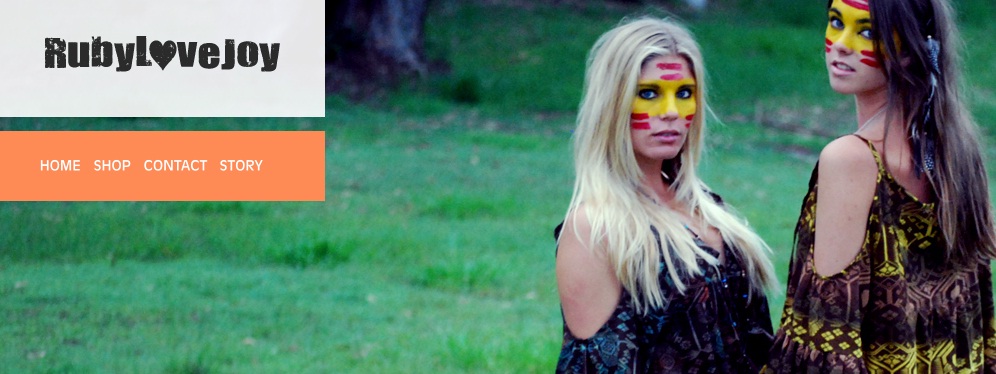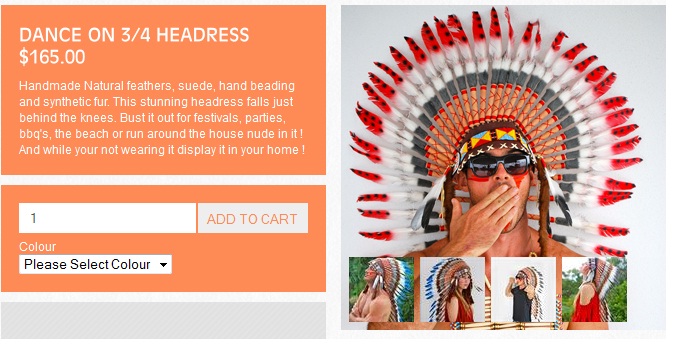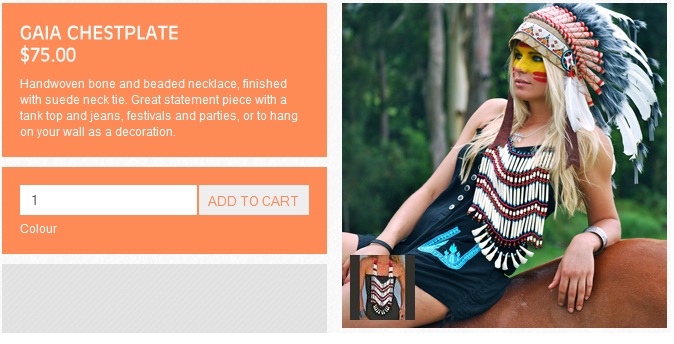Back in March of this year, I came across an online store called Ruby Love Joy. Based in Australia, this site featured (as you can see in this picture) a lot of men and women in face paint and “warrior inspired” headdresses. You will likely recognise a number of the pictures as they’ve been featured in my Hall of Shame ever since.
I wrote the company a letter to express some feelings I had about their products:
I recently came across your store, Ruby Love Joy. I wanted to write you to express to you how upsetting the images on your site are, as well as the products you offer under the “Warrior Inspired” line. For more information on why the headdresses in particular are disrespectful, please read this: https://apihtawikosisan.com/hall-of-shame/an-open-letter-to-non-natives-in-headdresses/
The images of models in ‘war paint’ perpetuates harmful stereotypes about indigenous peoples in North America. Your store embraces and celebrates our cultures as ‘costumes’ and this is deeply problematic and disrespectful of us, and of our symbols. I certainly hope you do not attempt to justify your exploitation of the stereotypes as having anything to do with ‘honouring our cultures’, because they do nothing of the sort.
The products you sell are named after specific indigenous nations such as the Apache, or Blackfoot. What percentage of your profits are going back to these nations? Did you at any point ask permission to use their names, or create products which supposedly represent these cultures?
You likely feel you are merely cashing in on a fashion, but your actions have consequences. You are personally helping to continue a historical trend of erasing our cultures through contempt disguised as ‘appreciation’ and your products denigrate important cultural symbols. What is more, passing your work off as having anything to do with our actual nations is dishonest and it is a shame Australia does not apparently have legislation akin to the Indian Arts and Crafts Act of 1990, as exists in the US to prevent exactly this sort of false marketing.
I sincerely hope that you learn more about our cultures and come to understand why the products you are selling under your Warrior Inspired line are so deeply problematic.
The company never responded to my letter.
They got a lot of negative feedback that day, from a great many people who were disgusted by their products. So much so that they actually pulled down their site, only getting it back up in the past few days.
As I noted in the letter, they had named their various headdresses after different First Nations, such as the Blackfoot, and so forth. In this new iteration, they have erased all specific names and given their products more New Age titles. I am thankful that they no longer have a product called the “Squaw Headband” (it’s now called the Praire Headband, which I think is supposed to actually say Prairie?).
I’ve got nearly 500 pictures in the Hall of Shame of people in headdresses, war paint, and “Indian costumes” of all sorts. Ruby Love Joy is not the only one doing this sort of thing. Nonetheless, their website is particularly egregious. So I wanted to revisit this issue of cultural appropriation.
They admire us so much, they ignore our feelings on the matter
Although headdresses seem to be the big thing lately, appropriating indigenous items in the name of fashion and ‘admiration’ is not a new phenomenon. In the excellent film, Reel Injun (which looks at the way Hollywood has portrayed native peoples over the decades) Sacheen Littlefeather discusses moving to San Francisco in the 1960s. She said, “[In the 60s] People asked me, what are you, are you a hippie? And I said no, I’m an Indian, what’s a hippie?” So unused to actually encountering a real aboriginal person were these people, that the more logical assumption was that she was a hippy.
A fascination with a mythologised version of indigeneity is arguably as American as apple pie and as Canadian as…well, maple syrup? Daniel Francis wrote about it in the Canadian context and more recently Mark Anderson and Carmen Robertson delved in in even more detail by examining English-language newspapers from 1869 to the present. This mythologisation allows people to both loathe and fear us and believe that we are inherently inferior, while at the same time lauding our ‘spirituality and closeness to nature’ and wanting these characteristics for themselves.
As is most excellently pointed out by Andy Smith, this mythologisation is not a small, unimportant thing. When I discuss issues like cultural appropriation, people quite often ask me, “don’t you have more important things to worry about?” To which I am forced to reply, “these portrayals and beliefs about who we are is a major factor in why we have so very much to worry about.”
The blog Native Appropriations has dealt with this issue repeatedly. From Pocahontas costumes, Johnny Depp as Tonto and probably most famously on the issue of Hipster Headdresses. The blog Beyond Buckskin has tackled all sorts of fashion-related issues, including how Etsy is being used as a clearing house for cultural appropriation. The fact is, there is a lot of information out there now with very specific arguments about why exactly it is so problematic for people to be wearing Plains-style warbonnets as a party favour. Nonetheless, existing power structures remain intact and reinforced by claims of ‘freedom of expression’ among those who admires us so darn much, that they really don’t care what we have to say about it.
You know what’s so incredibly ironic about all of this? Look at the prices on those images. These are on the ‘cheap’ side of headdresses available to hip young non-natives, but they are still a tidy chunk of change. Not only can our people not wear these items casually, we can’t even mass produce them and actually profit off this trend. Not if we want to actually continue to respect our cultures. If that isn’t all kinds of messed up, I don’t know what is.
So make some noise!
I’m not going to stop focusing on the big picture, and if you’ve followed this blog, you know very well that I don’t only focus on cultural appropriation. Nonetheless, sometimes I just gotta get my annoyance out there and if you feel the same way, then let’s make some noise!
I try my best to be respectful when I call out this kind of behaviour, and I am going to continue to do so. Nothing makes a person feel justified in their actions like having someone get angry at them. Humans are weird that way.
Nonetheless, it quite often doesn’t matter how politely you bring this subject up; it’s going to make some people very angry. Don’t let it get to you. We need to call these people out and hold them accountable for their actions.
Ruby Love Joy’s public contact information
Georgie Lee Pearce (owner), phone number.
Mailing address:
RubyLoveJoy 13 Elanora Ave Mooloolaba QLD 4557




8 Comments
Sharon Jackson · May 14, 2012 at 9:29 pm
The Andy Smith you speak of, is that the same person who wrote the damning indictment, “For those of you who were Indian in your past life”? Brilliant. Brilliant Brilliant.
I have used that article to help educate my British friends who have been overwhelmed by “Bluebird SpiritSky” type “shamans” and “healers.” It is revolting.
Sharon Jackson · May 14, 2012 at 9:33 pm
I wrote them this: ” Right. The cultural appropriation of North American indigenous cultures offends me deeply. If you tried this with your own indigenous people, I shudder to think of the consequences. Blonde Caucasians with painted faces and headdresses just look stupid.”
Elmo the aimless · May 17, 2012 at 9:52 am
Sorry to bring things back to language (and language extinction) again, but… it’s one of the founding subjects of the blog, and I don’t have any other medium to put the question to you (i.e., I don’t have your e-mail address), so it goes into this comments section.
When I was in Montreal a few weeks ago, I visited the Native Friendship Centre (that is, as you’ve mentioned, apparently shutting down, ASAP).
Although I realize that Cree is one of a dozen languages that could be taught in Montreal, they hadn’t heard of Cree being taught anywhere in Montreal, and although there are indigenous studies programs in various universities there (with many publications and conferences per annum) it seems that none of it pertains to actual language acquisition (neither for the students in the city nor for anyone living on reserve, etc.).
My problem is that this negative answer isn’t just coming from Montreal: I’ve asked about studying Cree at a long list of institutions (including universities, native outreach centers, and everything in-between) from B.C. to Quebec, with the greatest number being in Alberta, Sask., and Manitoba. The current situation seems to be that you can’t learn Cree in Montreal, but you can’t learn Cree in Winnipeg, either.
Many of the institutions I wrote to had some vague statement about a course (or a good intention pertaining to the language) but, when asked specifically, it seems that the course doesn’t really exist. Repeatedly, people said things like, “No, not here, but try talking to _____” –and, by now, I’m at the point where I’d have to reply, “No, I already talked to them, and they said they’re not teaching the language, and I should instead talk to you!”
In short, all of these efforts have come to a dead end.
There are very few active language teachers; and there are very few institutions of any kind teaching the language to adults.
The number of websites describing courses that don’t exist gives a false sense of reassurance; so too, the number of institutions that have some kind of First Nations “outreach” or “cultural center” gives some people the false impression that language acquisition (and transmission) are ongoing (i.e., in places that have never had a budget, nor a mandate, nor a teacher to carry on language courses, and most of them have never even thought about where the language could be learned when I’ve asked them).
Of course, many of these centers that people mistakenly assume deal with indigenous language because they’ve got the words “First Nations” and “Education” in their title are entirely occupied with helping kids fill out forms to enter college, or get scholarships, etc. etc. (there’s a lot of paperwork in the education system, and I’m aware that this is a real social service provided, especially for students struggling to bridge the rural-to-urban divide). However, all of this is a sort of distraction from the real paucity of any place to study the language …or even any place to hear the language spoken.
At this point, my question is where do I go from here?
Of course, more broadly, for anyone who wanted to learn Cree (in 2012) there would be the same question: many people falsely assume that having a single grandparent who speaks the language is sufficient to learn it (but I’ve met many people in that situation who lament that their grandmother or grandfather is not capable of (single-handedly) teaching or transmitting the language to them, even if they are capable of speaking it; in related news, not everyone who can speak Chinese is capable of teaching the language to someone whose only language is English, etc. etc.).
It really seems to me that I’ve exhausted all of the avenues open to me (over a huge geographic area) and I’m not in a position to create an institution that doesn’t exist. A few people have said to me that I should just hire a private teacher, but they really don’t understand how extremely scarce Cree language teachers are: it genuinely is an endangered language, and the few people who can teach it are generally very busy already. It simply isn’t the case that I can hire someone to teach me the language privately.
As with everywhere else I go, when I explained that I’m learning Cree in Montreal, they assumed that my wife was Cree (which is, I suppose, better than assuming that I’m a Christian Missionary who wants to translate the books of Psalms into Cree… again).
To be filed under Attawapiskat · May 17, 2012 at 9:49 pm
This is at least the second story APTN has filmed on this Catholic church and its (new) stained glass windows in Attawapiskat.
This is introduced as a contrast to “pictures of poverty and desperation in Attawapiskat”. Um… what’s your point? That the Catholic Church has plenty of money while the people of Attawapiskat are in a situation of dire poverty and homelessness?
Quotes that ensue with no stated sense of irony include:
“The couple received a $50,000 grant from the truth and reconciliation fund to create [the stained glass windows in the church].” (You mean that taxpayers dollars are going toward building and decorating a Catholic Church… as a method of compensating First Nations for crimes committed against them by the Catholic Church?).
http://aptn.ca/pages/news/2012/05/17/light-still-shines-in-attawapiskat-through-stained-glass/
The APTN reporter concludes by saying that “this project stands as a symbol of hope” –and, really, that may be the most pathetic reflection of them all. “Hope” is defined as a handout from church and state –or, in this case, to the church from the state.
Me · May 20, 2012 at 11:31 pm
I commented on a few incredibly offensive pictures on their FB page and shared it with my friends, asking them to comment as well. Thanks for bringing this to my attention.
Eliza Patt · June 4, 2012 at 9:01 pm
Your derogatory language with the reference to headbands is just about as offensive.
âpihtawikosisân · June 5, 2012 at 5:49 am
Which derogatory language, exactly?
Are you referring to the derogatory term “squaw”? As noted in the article, this was the actual name used by Ruby Love Joy before the site went down for its new name changes. I’m glad we all agree that the term “squaw” is unacceptable.
Rohan · November 18, 2012 at 8:18 pm
My father was born in Oaklahoma & is Choctaw / Chickasaw native. I was born in Australia & am part native & was presented an Eagle Feather in a dream at age 41. So I have only one Feather. I am not too familiar with my roots but read your blog & was inspired to view the website in Australia. I was surprised that the images were still up from last year. I decided to call the owner as I also have travelled extensively & enjoy other cultures as well. I expressed to the owner that I thought the website had some nice things but told her that I was surprised that her images were still there of the headress & war paint. Georgie told me that she was too busy & hung up in my ear . For somebody that has travelled to other countries & enjoys other cultures, I was surprised that she has not learned any respect for others as the name of her business suggests. I guess some people just can’t help themselves to rip off & exploit people. I will look into this further & do my utmost to reveal this phoney for what they stand for. Perhaps a television show like a Current affair may be interested?